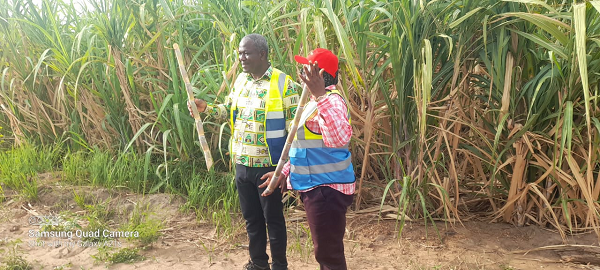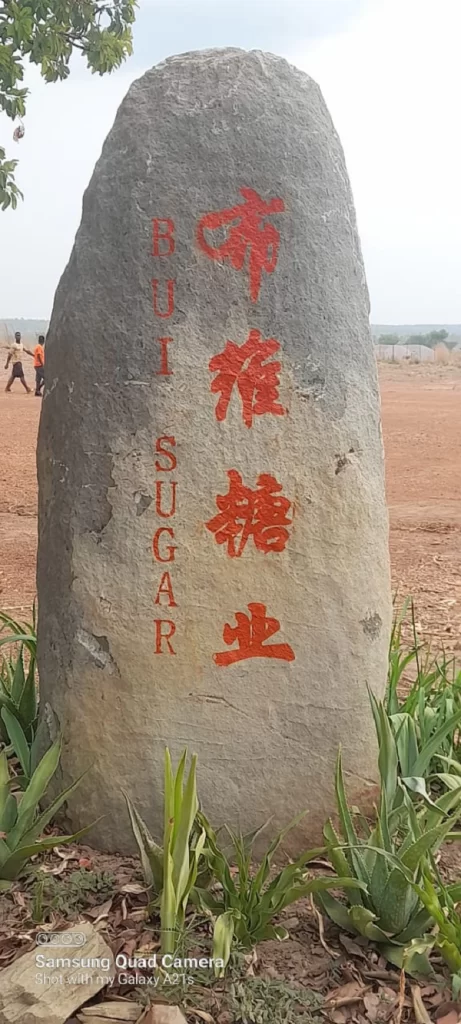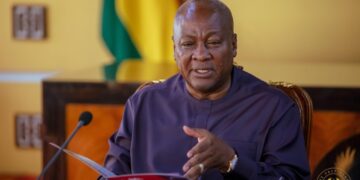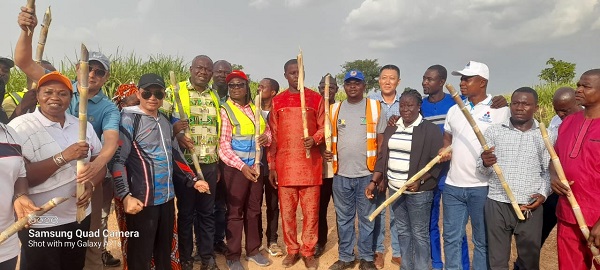The government’s One-District-One-Factory (1D1F) plan has commenced with the building of a sugar factory at Fawoman in the Banda District of the Bono Region. The project, which is anticipated to start full production by the end of 2024, is being built through an equity partnership between the Chinese company Bui Sugar Limited and the Bui Power Authority (BPA).
BPA has allocated a total of 13,000 acres of land to the Bui Sugar Limited under the initiative for the establishment of sugarcane plantations to feed the facility when it commences operations.
So far, the investor has planted sugarcane on 250 acres of the 1,200 acres of land that has been cleared.
Read Also: Fuel prices fall; GOIL, Star sell petrol at ¢12.65, ¢11.69 per litre
When the entire 13,000 or 6,000 hectares of land granted by the agreement is cultivated and the factory is fully operational, it is estimated to generate 60,000 metric tonnes of raw sugar per year for local consumption and export.
These were revealed when the Bono Regional Minister, Justina Owusu-Banahene, and the BPA’s Chief Executive Officer (CEO), Samuel Kofi Dzamesi, paid a visit to the facility to see how things were going.
Construction
Shedding light on the operations of the Bui Sugar Limited, the Managing Director of the company, Wan Wei Hua, explained that the actual construction of the factory block would begin in June, this year.
“The construction of factory and installation of equipment is expected to last for one-and-a-half years before the commencement of production,” he said.

Mr Samuel Kofi Dzamesi, CEO of the Bui Power Authority, appreciating the sugarcane plantation
He added that the company’s present priority was to provide appropriate raw materials and preparations for the building of the plant block.
Mr Hua stated that 500 locals have already been hired to cultivate the sugarcane plantation, and that around 1000 additional workers would be hired by the time the facility begins production.
Agreement
Mr Dzamesi, for his part, indicated that BPA entered into an arrangement with Bui Sugar Limited in March 2022 because the Act that formed the authority permitted it to do so.
He stated that when fully operational, the plant will offer around 1,500 direct jobs and over 5,000 indirect jobs.

Mr Dzamesi thanked President Nana Addo Dankwa Akufo-Addo and BPA board members for approving the building of a facility that will significantly benefit the socioeconomic lives of people in the area and beyond.
He requested the company’s management, as well as the chiefs and people of the area, to continue working together to maintain peaceful coexistence for the successful completion and operation of the sugar factory.
On how much BPA will earn from the sugar factory, Mr Dzamesi explained that “The agreement we have with them is on equity. That is if they produce sugar we take a percentage. I cannot disclose the percentage but I want to assure you that nobody can cheat BPA”.
Bono Regional Minister
For her part, Ms Owusu-Banahene said “I am impressed by how this project is been executed. I think it will be the game changer to the people of this area, the Bono Region and the whole country”.
She discovered that, in addition to raw sugar production, the byproduct might be utilized to produce animal feed, among other things.
Ms Owusu-Banahene went on to say that the sugar factory project was an example of what the government’s 1D1F initiative could do to improve people’s socioeconomic lives, and she urged Ghanaians to support it.
She praised the BPA for its vision and urged other CEOs and MMDCEs to follow suit and come up with commendable ideas that may generate revenue for the country.
Mobilise resources
Emmanuel Akone, the Banda District Chief Executive, urged the Bono Regional Coordinating Council to pay special attention to the region’s God-given assets and mobilize the necessary human and material resources to invest in crop production through mechanised irrigation, aquaculture, and animal rearing.
“We are proud to be a beneficiary of the on-going construction of sugar and cashew factories under the Government’s One-District One-Factory policy”, he stated.
SOURCE: GRAPHICONLINE

























